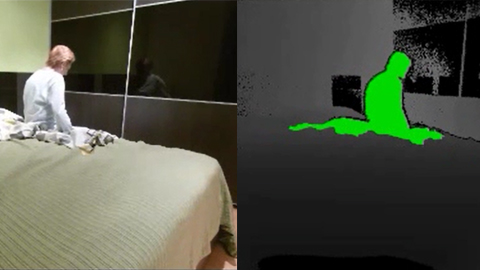New tool to help carers of dependent persons

30/09/2015
Researchers at the Computer Vision Centre (CVC), Universitat Autònoma de Barcelona (UAB), University of Barcelona (UB) and the Open University of Catalonia (UOC), together with the company Acceplan, have created a smart monitoring system aimed at carers of dependent persons. This is a device based on computer vision and artificial intelligence technology that captures images of the dependent person – while maintaining strict anonymity –, analyses the person's position and situation and, if it perceives a situation of risk, immediately warns the carer through a mobile application.
The system, known as Care Respite, aims to improve carers' quality of life by making their job easier and raising their sense of security and peace of mind. According to data from the Institute of Statistics of Catalonia and the latest Spanish National Health Survey, in Catalonia there are 1,361,000 people over the age of 65, 46% of whom have some kind of functional dependency and need help with personal care, household chores or mobility. "This help usually comes from the dependent persons' immediate family, who spend 6 to 8 hours or more looking after them, which puts a heavy load, both physical and emotional, on these family members, affecting their health. By using Care Respite, carers can be more effective and at the same time improve their own quality of life”, explains Sergio Escalera, a researcher at the Computer Vision Centre and the University of Barcelona.
Care Respite consists of a camera that can capture day- and night-time images, and microphones and loudspeakers that capture sounds in the room, enabling the dependent person to talk to the carer without the need for any other device. A mobile application connected to the system enables the carer to personalise it, receive warnings and visualise the behaviour of the dependent person. The application sends warnings when it detects situations of risk, such as falls or atypical actions, and also if the system fails to operate because there is no internet connection or power supply.
According to UOC researcher Xavier Baró, "at present, the most commonly-used warning systems for household accidents are based on emergency alert buttons or telephone monitoring. The first of these depends on the accident victim using it, and means the device has to be carried around at all times. In the second case response times can be very long, increasing the chance of complications following accidents. On the other hand, Care Respite uses non-invasive monitoring, at a lower cost and available to be used in the dark or low-light conditions. Furthermore, this new device respects the privacy of persons being monitored, as it only shows their silhouette".
An idea from the Ideas Laboratory of the UAB Research Park
This project was launched two years ago thanks to an Ideas Laboratory set up by the UAB Research Park, for researchers, end-users and companies to work together on finding solutions to the problems of ageing. The idea for Care Respite, and the team that developed it, came from this laboratory. The project has matured to the point of making a prototype that will soon be tried out in private homes and care homes for the elderly. “We expect to begin commercialising the product at the end of 2016", says Martha Mackay, of the company Acceplan. “For that reason, the idea is to set up a spin-off company that will transfer knowledge from the university to society and offer a technological product that can help both dependent persons and their carers", adds Jordi González, a researcher at the Computer Vision Centre and the UAB Department of Computer Science.
This project was recently selected by the CaixaImpulse programme, of the “la Caixa” bank, which aims to help society to benefit from scientific knowledge by promoting new companies and products in the field of life sciences and health. The company was awarded 50,000 Euros, as well as access to specialist training and advisory services.
More information
Video on Care Respite
Presentation of Care Respite project at Spin UOC 2015